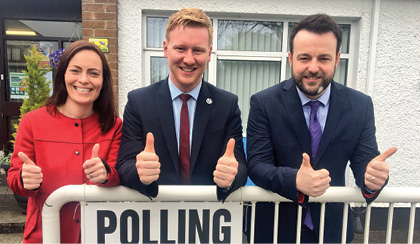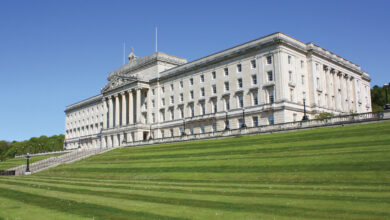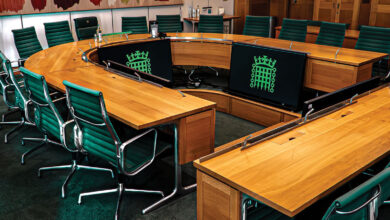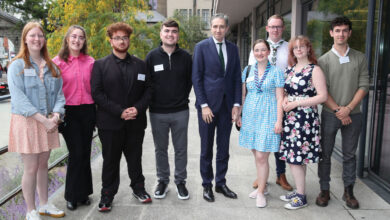Party conferences
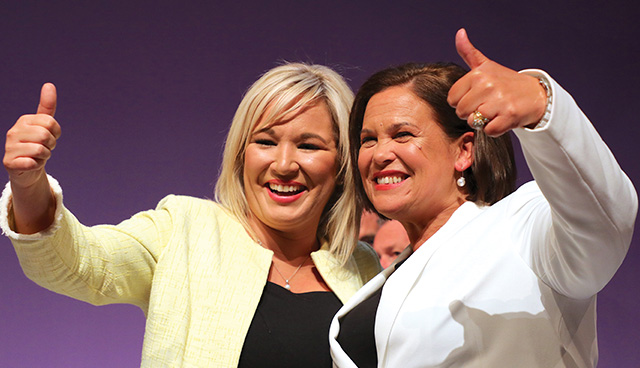
Media focus at Sinn Féin’s 2018 Ard Fheis was primarily concerned with two key junctures: the first was the party’s debate on abortion and the second was Mary Lou McDonald’s first televised presidential address.
In a year that marked the centenary of women’s suffrage, the contemporary issues facing Irish women were co-equal to the other policy priorities outlined at Sinn Féin’s annual conference, including Irish unity, housing and healthcare. Underscoring this, the faces of the new leadership duo of Mary Lou McDonald and Michelle O’Neill were emblazoned upon a huge purple banner on the side of Belfast’s Waterfront Hall.
The symbolism of that purple hue, selected due to its historical association with the suffrage movement and contemporary feminism, coloured much of the conference. The Ard Fheis was opened by newly elected Mayor of Belfast, Deirdre Hargey and a significant portion of McDonald’s closing address was dedicated to creating “a new Ireland” in which women will “finally have our place as equals”.
Unsurprisingly, the Ard Chomhairle-sponsored motion (93) to accept that “abortion without specific indication should be available through a GP led service in a clinical context as determined by law and licensing practice for a limited gestational period” was passed virtually unanimously. Indeed, all motions in the new “standing with women” section were passed, with one distinct exception. While billed as not being mutually exclusive from motion 93, motion 95 – which proposed that all Sinn Féin members should have a conscience vote on the issue of abortion – was emphatically defeated for a fifth time.
The subsequent resignation of Carol Nolan, now former Sinn Féin TD for Offaly, who campaigned for the Love Both campaign prior to the referendum on Eighth Amendment was not unexpected. Indeed, McDonald’s response stated as much: “I very much regret Carol’s decision to resign from Sinn Féin. Her resignation is disappointing but not surprising… The Sinn Féin Ard Fheis has democratically agreed the party’s position to support the forthcoming legislation.”
In her leadership address, McDonald asserted that party policy had been decided, indicating that “we now move forward together”. Under the slogan ‘A New Ireland – le chéile [together]’, she added: “And let me say this loud and clear – the North is next. No woman will be left behind. Every woman who calls this island home must have access to compassionate medical care at home.”
Ironically, just as Sinn Féin has formally adopted a liberalised abortion policy, widely regarded as a hallmark of parties of the left, the party has edged closer to the centre. Motion 52 proposed that “while Sinn Féin may engage in discussions with other political parties after any election, the party’s only objective will be to form a broad left-wing government comprising parties and independents of a similar political ideology”. However, the proposing cumann accepted an Ard Chomhairle amendment in which the words “should attempt” replaced “only objective” so as not to inhibit to formation of what the party leadership refers to as a “progressive” government.
After the next election in the South, McDonald has indicted that her party will “talk to all political parties and the independents”. The challenge now is to make it impossible for the two larger parties to ignore their legitimacy as potential partners. The Dubliner stated: “We are here, we are equal. Our democratic mandate and, more importantly, the people who vote for Sinn Féin will be respected. It is not for Leo Varadkar or Micheál Martin to decide whether or not we enter government. That decision will be made, in the first instance, by the people.”
Despite the stated objective of entering government after the next election, as things stand, it seems more likely that the party will complete its consolidation of the electoral space formerly occupied by the Labour Party. While the prospect of being in government in each of the island’s jurisdictions is an enticing prospect for the party’s northern leaders, the brand of prospective coalition will be more closely scrutinised by its ideological left, uneasy with the neo-liberal instincts of both Fine Gael and Fianna Fáil. Coupled with this scepticism is a demonstrable trend of junior coalition partners being reduced to governmental mudguards.
Change comes dropping slow and it is subtle. It would be naïve to imagine that in the space of a few short months since Gerry Adams’ departure, Sinn Féin is a fundamentally transformed party. However, there is a shifting of the sands as it moderates the tone of its economic policy and attempts to unlock the long-prophesied support of the ‘squeezed’ middle and working classes, made possible with a Trinity-educated Southsider, without conflict baggage at the helm.
Indeed, the ‘shared prosperity’ phraseology, a central tenet of McDonald’s leadership is straight from Hilary Clinton’s campaign handbook, first used in an appeal to struggling American workers during her bid for the presidency.
At the same time, as the two Civil War parties scramble to publicly outdo each other in statements about who is least likely to form government with Sinn Féin, the reality is that many of the rank-and-file in the parliamentary parties are ready and willing should the need arise.
SDLP abortion conference
Meanwhile, at a specially convened SDLP conference to discuss abortion, the party reaffirmed its pro-life status. The behind-closed-doors meeting in Maghera, County Derry was scheduled to take place less than a week before the Eighth Amendment referendum, the rationale being that the party’s annual conference did not afford sufficient time for discussion of the issue.
After announcing details of the conference, party leader Colum Eastwood outlined: “We are not talking about changing the fundamental position, the party position is pro-life but the party membership set out our policies. What we are talking about, and what is up for discussion, is the issue around conscience.”
Subsequently, an official statement indicated that delegates reaffirmed the SDLP’s position as a pro-life party while, simultaneously, supporting freedom of conscience, meaning that the whip will not be applied to elected representatives.
This decision enables the SDLP to act as a broad tent, providing some breathing space for its pro-choice members, without isolating its long-standing representatives and traditionally conservative voter base.
As things stand, a significant number of SDLP figures, including Sinéad Bradley, Mark H Durkan, Colin McGrath and Alasdair McDonnell are explicitly pro-life. Indeed, during the West Tyrone by-election in May, SDLP candidate Daniel McCrossan fought his campaign with particular emphasis on his pro-life credentials. The campaign tactic of exploiting Sinn Féin’s pre-referendum position in what is regarded as a relatively conservative rural constituency may have been a factor in the 4 per cent reduction in the vote share secured by Órfhlaith Begley and 4.9 per cent increase in the SDLP’s performance.
Speaking after the decisive vote in the South, Eastwood stated: “We must commend both sides for emphatically defending their conscience in this referendum… There will be many across our nation today who will be unnerved and uncomfortable with this outcome. People of good intent who fought this referendum on the basis of their deeply held beliefs must be met with grace and our priority must now be bringing people back together.
“Elected representatives in the North must now turn to the facts of the working group report to ensure our laws are fit for purpose and the days of exporting this issue are brought to an end.”


